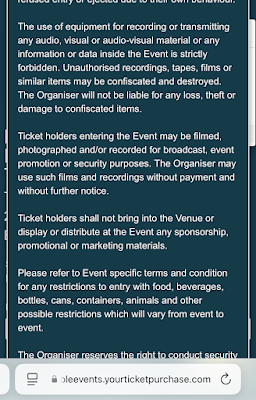Search This Blog
tolerance is about accepting those things you don't agree with, not just accepting those things you do agree with
Featured post
- Get link
- X
- Other Apps
FEI Clarify their "Non-rights Holders'" Guidelines for Publishing on Social Media at FEI Named Events
What is a Non-rights Holder (NRH)?
Today social media is awash with news that the FEI are to update their requirements for videoing at their "named" events (things like the FEI European championship, FEI World Cup, etc). The rules sound quite similar to those that I’m used to at Badminton Horse Trials where only the media rights holder is allowed to video on the 'field of play' with limitations around the 'kiss and cry'; where this appears to go further is in restricting the video that competitors and their connections can post and it also puts restrictions on accredited media.
"NRH include Athletes, Athlete Support Personnel, Athlete Entourage (e.g. grooms, agents etc.), Horse Owners, National Federations, Officials and Accredited Media, including broadcasters."
It could be that they are quite literally shutting the stable door after the horse has bolted or it could simply be they are tightening up their commercial rules before the Paris Olympics; the media rights holder may have insisted on that.
.JPG) |
| Keep your eye on the Prize? ©Harveywetdog |
Commercial necessity or stifling debate?
Is it going to help in the social license arguments, probably not? I always remember Julie Taylor saying that she gathered all her material on the Tokyo Olympics, simply by which watching the official footage. So the disaster in modern pentathlon, dressage horses with blood in their mouth and horses breaking down on the cross country course, that all happened in plain side to a worldwide TV audience. And so restricting what people can put on their social media isn’t really going to change the thrust of the overall campaign, and neither can they restrict what the public post.
Now it could be if you're a particular thorn in their side they might come after you, they’ll claim that they have the rights, and they'll raise that with whatever social media platform you’re choosing to use, YouTube, Facebook, Tick-Tock whatever, but then they'll have to fight those individual battles and we’ll see how those platforms react, whether or not it’s deemed that what you put onto social media is in the public interest.
What this means for me
For me personally there are a number of events where I’m still happy to be accredited, obviously with accreditation comes control. I think I’ve explained that before and I always think that’s a far better way for FEI to work rather than trying to implement rules around a situation that in all reality they can't control.
"Blood injuries, horse falls, horses being overridden, inexperienced riders being over faced etc will all occur in plain site and don't require clandestine videoing"
So for example, I’m not accredited at Badminton and I wouldn’t have any compunction about putting exactly what I see as a paying spectator on my social media, whereas if I’m at one of my accredited events, obviously if the media officer tells me not to post a particular piece of video then I’m honour bound not to post it, plus I'll have in the back of my mind that I might not be welcome next time if I bring the event into disrepute.
So remember that you're likely to see everything that’s wrong with equestrian sport on the official Olympic footage, you won’t need to wait for some clandestine videoing to show you what’s really going on; now if you’re going to go to somebody’s yard and do a bit of clandestine videoing that another matter, but I really wouldn't recommend anyone doing that.
Summary
Video Rights have always been a minefield, and it will be interesting to see how this plays out. These are basically the rules as they apply to accredited media at Badminton for example.
But this feels more like commercial tightening up the rules prior to the Paris Olympics and usually happens because the media rights owners complain to the governing bodies about people undermining their revenue stream and the FEI now have a big stick to hit offenders with. While it doesn’t apply to the public, who knows what it’s going to say on the back of your ticket?
 |
| Blenheim 2024 ticket small print Interesting? |
- Get link
- X
- Other Apps
Popular Posts
My Sony PXW-Z190 Video Camera Experience - Caveat Emptor!
- Get link
- X
- Other Apps
Solum Rights - good try but ultimately doomed to fail?
- Get link
- X
- Other Apps


Comments
Post a Comment